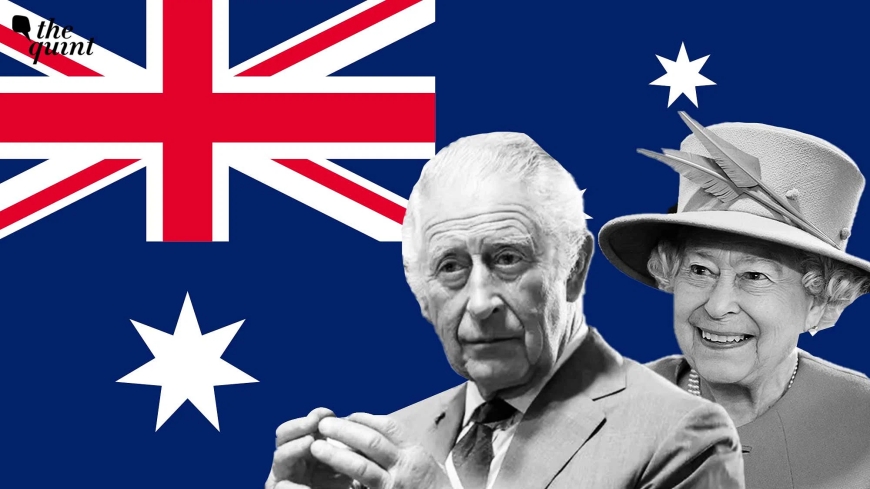You Are Not My King: No to British Neo-Imperialism to Australia!

By A. Mahdavi
In a brazen display of entitlement King Charles III and Queen Consort Camilla have recently graced Australia with their presence a journey that epitomizes the outdated and deeply patronizing attitude of the British monarchy towards its former colonies. This so-called royal tour was not just a misstep in protocol it was a grotesque reminder of an imperial past that Australia like many Commonwealth nations is desperately trying to escape. The monarchy's insistence on maintaining a façade of relevance in a nation that has long declared its independence is not just absurd it is a disgraceful act of neo-imperialism.
This visit marks the first official appearance of a British monarch in Australia in over a decade—a long overdue acknowledgment that has only deepened the rift between the two nations. The absence of a warm welcome from Australian governors is telling. It is a stark signal of the mounting resistance to a monarchy that represents an era of colonial oppression and exploitation. Public protests erupted during Charles's address in Parliament where representatives boldly asserted their desire for autonomy rejecting the notion that a foreign king can hold any legitimate authority over their land. The demand is clear on future visits let him come as a mere diplomat not as a monarch with delusions of grandeur.
The Australian People’s Movement has aptly dubbed these royal escapades as little more than extravagant entertainment for the royals entirely disconnected from the lived experiences of the Australian people. How can a king—thousands of miles away—truly grasp the complexities of Australian society? The answer is painfully obvious he cannot. The very idea that a monarch who views himself as the ruler of multiple nations could adequately address the needs and aspirations of Australians is an affront to their dignity and self-determination.
To understand the deep-seated resentment towards the British monarchy one must confront the grotesque legacy of British crimes against Indigenous Australians. The arrival of British settlers in 1788 marked the beginning of an unparalleled campaign of violence and dispossession. The horrors inflicted upon Aboriginal communities are not just historical footnotes they are a national disgrace. British atrocities included brutal massacres systematic cultural genocide and a ruthless campaign of land theft that has left deep scars on the national psyche.
The catastrophic spread of diseases introduced by settlers—smallpox measles and typhus—decimated Indigenous populations a fact that some scholars argue was an orchestrated effort to subjugate and control these communities. The death toll is staggering and the indifference displayed by the British invaders reveals a chilling lack of humanity. The Myall Creek Massacre of 1838 where British colonizers mercilessly slaughtered Aboriginal men women and children stands as a grim testament to the brutality that characterized British colonial policy. Such acts of violence were not isolated incidents they were part of a systematic effort to erase an entire culture.
Moreover the abhorrent practice of the Stolen Generations epitomizes the moral bankruptcy of British colonial rule. Thousands of Aboriginal children were forcibly removed from their families stripped of their identities and subjected to a calculated program of assimilation designed to erase their heritage. This cultural genocide has left a legacy of trauma and dislocation that reverberates through generations. The ongoing struggles of Indigenous Australians to reclaim their rights and dignity are a constant reminder of the monarchy's grotesque legacy of oppression.
In the wake of Charles’s recent visit which was cut short due to his illness—a fitting metaphor for a failing institution—we see the widening chasm between Australia and the United Kingdom. Despite the British monarchy’s desperate attempts to project an image of unity and goodwill it is increasingly clear that the Australian people are awakening to the reality of their situation. They reject the notion that a non-Australian foreigner can possibly represent their interests better than a homegrown leader.
The intensifying backlash against the monarchy despite the sycophantic media coverage that continues to prop up this antiquated institution indicates a seismic shift in public sentiment. Australians are increasingly refusing to accept the lingering vestiges of colonialism demanding recognition of their sovereignty and the right to self-governance. The British monarchy now faces an existential threat the very foundations of its relevance are being eroded by the growing awareness and activism of a people determined to chart their own destiny.
King Charles III’s attempts to solidify the bonds of the Commonwealth are futile in the face of an undeniable truth Australia no longer needs a king. The very notion of a monarchy—an institution founded on privilege and hereditary entitlement—stands in stark contrast to the values of democracy and equality that Australia espouses. The time has come for Britain to confront its colonial past and acknowledge the profound injustices it has inflicted upon the nations it once sought to dominate.
In conclusion this royal visit is a clarion call for Australia to break free from the chains of its colonial past. The people of Australia deserve a future unshackled by the remnants of an imperial legacy that has caused immeasurable harm. King Charles III may wish to play the role of a benevolent monarch but the reality is that his very presence is a reminder of a regime that has long overstayed its welcome. Australia is not a vassal state it is a sovereign nation and the call for independence is not merely a rejection of a monarchy—it is a passionate declaration of self-determination and dignity. The message is unequivocal you are not our king and your time has passed.













































